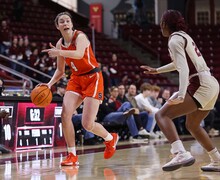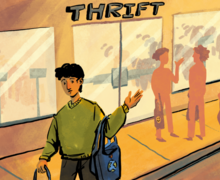Decide what classes to register for based on this season’s election candidates
Lucy Naland | Senior Design Editor
Today is election day, and these political candidates are here to help you pick your classes.
With this season’s political candidates fighting hard to win votes on Tuesday in the presidential and local elections, they have all shown America what their strong and weak suits are. Some candidates could probably teach a course in foreign policy, while others could use to take a class or two to brush up. The Daily Orange Pulp staff is here to help you choose your courses for next semester with this list inspired by different candidates:
HILLARY CLINTON
WGS 101: Introduction to Women’s and Gender Studies
If elected, Hillary Clinton will break the glass ceiling and become the first woman president — a big victory for American feminists. The introductory women’s and gender studies class is perfect for students looking to immerse themselves in feminism and debunk some of the stigmas surrounding it.
Simone Puff, an assistant professor of women’s and gender studies said the class delves into systems of oppression and ways to dismantle them, as well as the intersection of racism, sexism, classism and heterosexism and how they play out in students’ lives.
Overall, Puff aims to make her class discussion and critical thinking-oriented to expand the minds of her students.
“Students in the past have often said how they now view the world differently,” she said.
While WGS 101 is a large lecture in the fall, the spring class is a small 25-person class and includes projects that allow students to utilize their creativity.
IST 323: Introduction to Information Security
If you, like former Secretary of State Hillary Clinton, need to keep your top-secret information secure, IST 323 may be the class for you.
This introductory class has no prerequisite, and aims to give students a comprehensive picture of information security, said Joon Park, an information studies professor.
The course aims to give students a broad knowledge in areas like security policies. Park stressed that the class is not computer science-oriented — it is about the non-technical issues like policies and management.
The class is comprised of lectures, discussions, student presentations and case studies. The class has a cap of about 30 students and also includes 5 hands-on labs throughout the semester, Park said. In one lab, students use a software to crack passwords with different levels of security.
DONALD TRUMP
PTG 256: Figure Drawing
Donald Trump has been captured through portraits and sculptures like no other candidate. In this class, you can follow in their footsteps.This hands-on class teaches the art of drawing the human body and an appreciation for figure composition.
While Stefan Zoller, an adjunct professor of art, said class time mostly revolves around drawing with a live nude model, there will also be assigned homework centered around anatomy drawing — sketching bones and muscles. Learning what’s underneath the skin helps with figure drawing, he said.
While he recommends that students coming into the class have a solid drawing ability, he said his classes typically vary widely in skill level and that figure drawing ultimately helps everyone become a better artist.
“Most students who come out the course really have a much better understanding of drawing the human figure and their overall drawing abilities are really pushed to a much higher level,” Zoller said.
FIN 345: Financial Management
While Donald Trump built his business empire, he had to distinguish between sound financial decisions and ones that would end in bankruptcy. Build the basics of those skills in this class.
“We primarily use a case study approach in the class to create a real world decision-making aspect to the course materials,” said James Seward, an associate professor of finance.
This creates a more hands-on environment for the class, and Seward said the class is much more interactive than a normal lecture class. He said students gain skills including the ability to analyze and write about a business problem and to communicate their decision.
Seward said he wants to give his students a “deeper appreciation of the important role that finance plays in the success of business organizations — as well as in their own personal lives.” Financial literacy is critical for everyone, he said, no matter what your professional career may end up being.
JOHN KATKO
LAW 790: Counterrorism and the Law
Before hitting the House, Rep. John Katko (R-N.Y. 26) got his start in law. He’s an alumnus of Syracuse University’s College of Law, and now focuses on national security in the House — topics that perfectly blend into this class, taught by Nathan Sales, an associate professor of law.
Counterterrorism and the law is very much a traditional law school class, Sales said. There’s no hour-long lectures or working on group projects. Instead, it’s a discussion between students and the instructor.
But there’s no set curriculum year after year — past topics have ranged from detaining criminals to drones interrogation.
“That’s what I love about teaching this class — it changes every semester,” Sales said. “Who knows what it’s going to be next year?”
CHUCK SCHUMER
PSC 300: Pot, Guns and Climate/Controversies
Sen. Chuck Schumer (D-N.Y.) has held his seat for the past 18 years, so he’s no stranger to controversial laws — and fighting to get his way.
Schumer couldn’t get to the Senate and stay this long without learning how to fight for his beliefs. Bridget Kelley, a Ph.D. candidate in political science, built this class for students who want to follow Schumer’s path — or just discuss controversial topics.
Instead of textbooks, Kelly said students learn about discussion topics through news stories and academic articles. Then, they head to class to discuss those topics.
“I’m not trying to change your opinion, but help you be better educated about why you think that way,” Kelly said. “And so you have more empathy for why people think otherwise.”
It’s all in an effort to look at where policies have worked in the past and how they can be shaped in the future, Kelly said. Making the topic controversial just makes it more interesting.
WENDY LONG
PHI 391: History of Ethics
Wendy Long has built her fight for New York’s 26th District on doing what’s right for the United States. She wants to clean up corruption and stop career politicians — essentially doing what she thinks is ethical for the U.S.
Take a look at where the philosophies behind ethics got their start in this class, taught by philosophy Ph.D candidate Nicole Dular.
“We look at historical figures — people who are long dead and gone, but their ideas are still alive and well,” Dular said.
But this class isn’t just about learning history, Dular said. It’s about critically engaging with those histories to improve upon them and make a change in the future.
JILL STEIN
GEO 103: Environment and Society
As the Green Party candidate, Jill Stein hasn’t been quiet about her belief in climate change and the fact that we need to do something about it. This class will get students acquainted with environmental issues, including water, wildlife, and Bob Wilson, an associate professor of geography, said is probably the most important: energy and climate change.
Unlike a science class, GEO 103 looks at environmental issues from a social aspect — who can cause them, who can do something about them.
“I often say climate change is a problem caused by your great-grandparents, your grandparents and your parents,” Wilson said. “But it’s a problem that you, your children, your grandchildren and your great-grandchildren will deal with.”
Wilson added that the class aims to give students the knowledge to decide how they’re going to address the issue and how they’re going to live their lives.
COLLEEN DEACON
CFS 201: Family Development
As a single mother, Colleen Deacon has built up her family on her own. This class analyzes family development on both the macro and micro level. On the macro scale, students look at historical perspectives, economics, politics and religion, said Kamala Ramadoss, an assistant professor of child and family studies. With a more individual approach, the class looks at communication in families, as well as family formation and dissolution.
The class is an introductory level course, so Ramadoss likens it to a “little window into the fields of family studies.” Students can then decide to take different routes if they want to further study family development, such as paths down gender or violence.
The child and family studies program is also “pre-approved for a certification as a family life educator.” So it’s a great first step towards a professional career related to families.
GARY JOHNSON
ARB 336: Arabic Culture
Everyone makes mistakes, but they certainly get magnified when you’re running for president. Gary Johnson made quite the gaff when he admitted to not knowing what Aleppo is while appearing on MSNBC. Aleppo is a city in Syria considered to be the center of the refugee crisis.
To avoid making the same mistakes as Johnson, students might consider ARB 336, a class Rania Habib, assistant professor of linguistics, said is necessary to understanding the situation in the Middle East and the 22 countries in the Arab world.
“This course is really essential if you want to understand what is going on there and how people think how people behave and why things are happening the way they are happening right now,” she said.
Students will dive into so many aspects of Arabic culture, from social issues to the arts. Habib said it’ll have plenty of engaging discussions and thought-provoking ideas.
Published on November 7, 2016 at 10:33 pm





